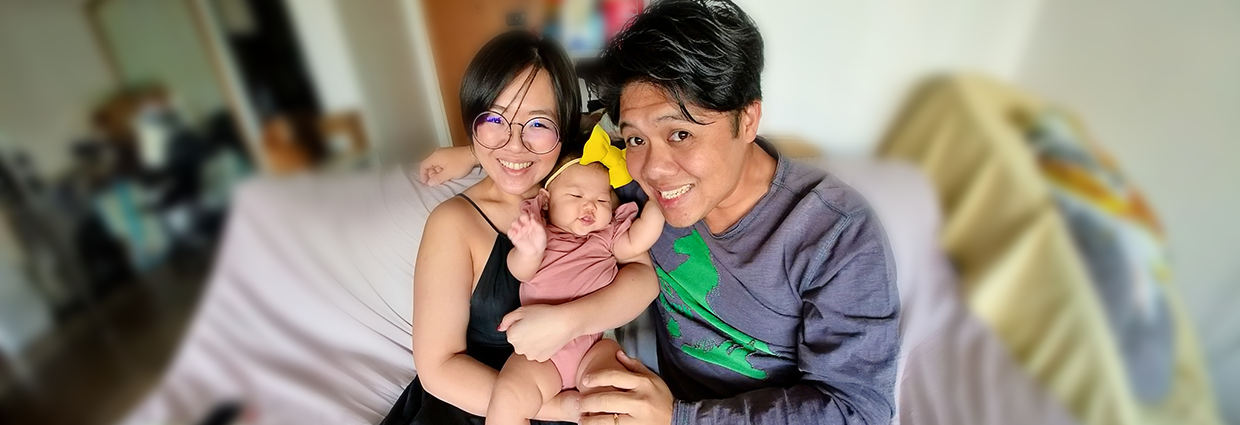When Aria was born just before Chinese New Year, Sean Ng and Deborah Tan, both 36, decided not to engage a confinement nanny and do it all themselves. With no helper, a house full of baby gear and two cats, Sean stepped into a new role: rocking baby at 3am, brewing soup, and learning that babies don’t come with user manuals.
We speak to Sean about what it was like navigating those early days and why showing up made all the difference.
“I called myself the ‘Confinement Manny,’” Sean joked. “But it wasn’t just a title; I realised that it was a full-time, full-on job.”
Baby Aria was born just days before Chinese New Year when confinement nanny rates were at their peak. For Sean and his wife, Deborah, the decision to forgo help was shaped by both comfort and cost.
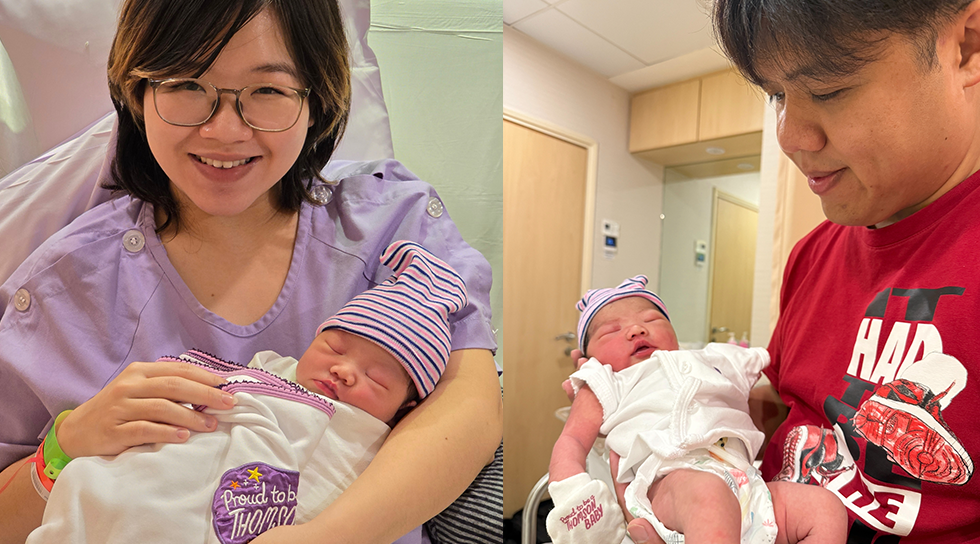
“It just felt more comfortable for us to do things ourselves,” Sean explained. “I looked at Deborah and said, ‘You know what? I got this.’”
That was how Sean stepped into his new role – in milk-stained tees and burping cloths, willpower and whatever energy he could muster from a few hours of sleep.
Helperless but Not Helpless
Without a confinement nanny or live-in helper, Sean and Deborah managed the early weeks of newborn life on their own. Yet, they weren’t always alone.
“We were really blessed,” Sean shared. “We were one of the last among our friends to have a baby, and that came with a lot of perks.”
Friends rallied around them. There were hand-me-downs galore: baby clothes, carriers, cots, a pram, and even a steriliser. Their bedroom became “baby ops HQ” with a crib squeezed in, a nursing corner set up, a baby-changing table, and a strategically placed diaper bin.
He quipped, “Their support helped so much with the preparation and cost.”
It also reminded the couple that they weren’t completely alone. Their ‘village’ had shown up in quiet, generous ways.
This is Teamwork
“Over the years of our marriage, we’ve come to understand one thing: communication is everything,” Sean shared introspectively. “Not just what was being said, but also what’s expressed between the lines.”
Most of the time, little signals like a glance or sigh were all it took to know what the other person needed. And how do they cope with the division of labour?
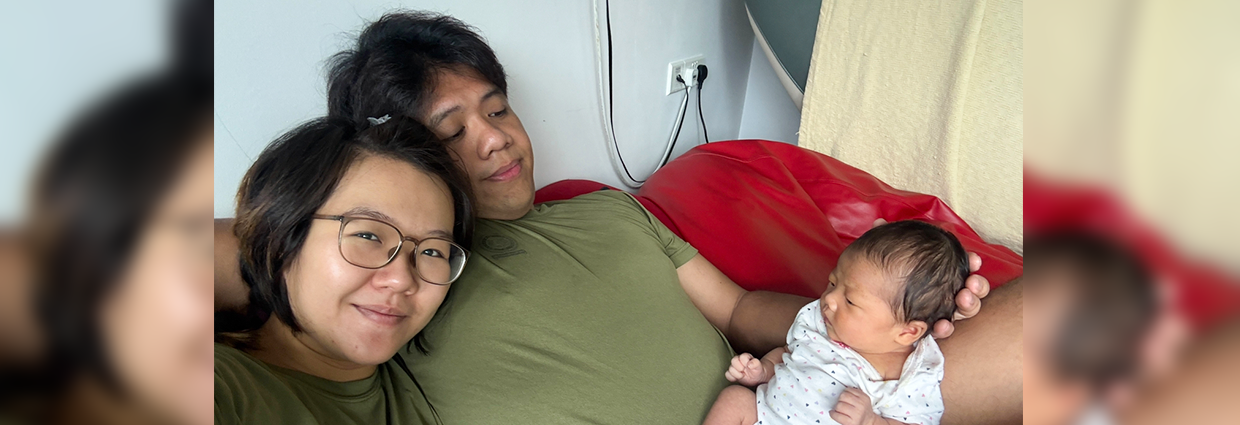
“We didn’t make a list or draw lines during confinement. Deborah did what she was good at — breastfeeding and soothing Aria. I did the rest, like preparing soups, cleaning, bathing baby, and helping Deborah with things she couldn’t do because of confinement practices.”
“It’s a partnership. It’s not a perfect 50/50 split, but more like: ‘Who has the capacity now, and how can we help each other?’”
That kind of mindset turned out to be their most useful skill in the early days.
Freedom in Confinement
“I was preparing soups, cleaning up, fielding the occasional client email, and trying not to bump into furniture in the dark,” he said. “I even washed my wife’s hair. It sounds simple, but that moment of care meant everything to Deborah and me.”
To be fully present during that period, Sean took two weeks of Government-Paid Paternity Leave (GPPL), and paired it with two weeks of annual leave. He started planning for it the moment they learned that they were expecting.
Though Sean didn’t have formal flexible work arrangements, his boss was supportive. He was able to take the occasional time off to accompany Deborah for her prenatal appointments. “It meant a lot,” he shared. “Those check-ups were milestones and I wanted to be there.”
For Sean, GPPL was more than a policy. It gave him complete legitimacy to be there for his family, not just to lend a hand, but to fully step into his role as a parent from the very beginning.
“We’re moving into a new era of fatherhood,” Sean said. “It’s not just about bringing home the paycheck anymore. It’s also about doing night feeds, changing diapers, and being there emotionally for your partner and your child.”
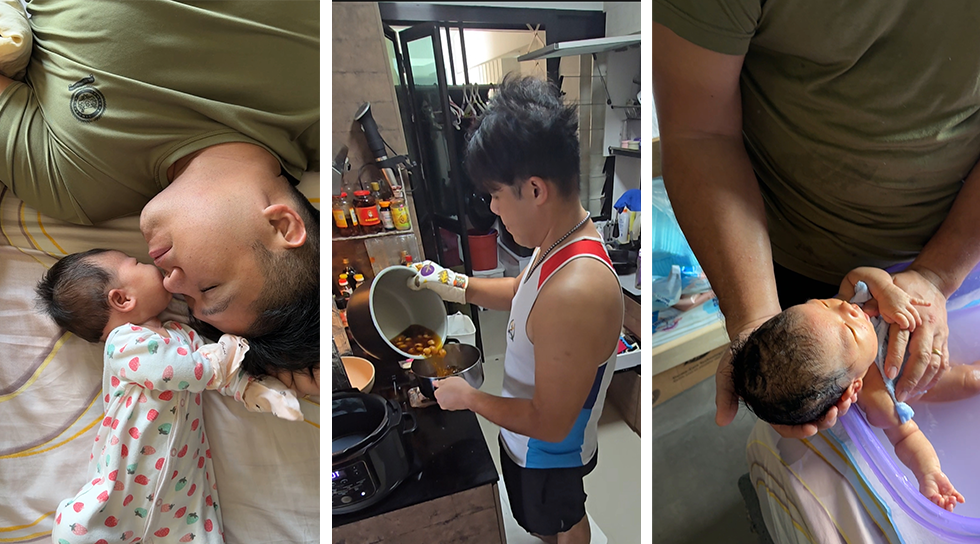
Small Tasks, Big Meaning
Sean was acutely aware of the invisible load Deborah was carrying. As a new mother, it meant emotional fatigue and the never-ending to-do list that ran quietly in the background of her mind.
“What a woman suffers from most during this period is a heavy anxiety and an invisible mental load no one sees,” he said. “When you are proactive, you lighten that load.”
So Sean took action, and often before Deborah had to ask.
Whether it was running out for groceries, fetching her bubble tea, washing the nursing pump parts, or making sure the baby’s nail clipper was where it should be, Sean did his best to cover the little things.
Now that he’s back at work full-time, he makes it a point to check in during the workday.
“Sometimes just a quick ‘How’s baby doing?’ or sending a meme to make her smile,” he said. “It’s not always about big gestures. It’s the small, daily reminders that we are a team.”
He would often take over baby duty after hours to give Deborah a break. “She gets to have her ‘me time,’ even if it’s just sitting in silence on the couch. In baby world, this is a luxury.”
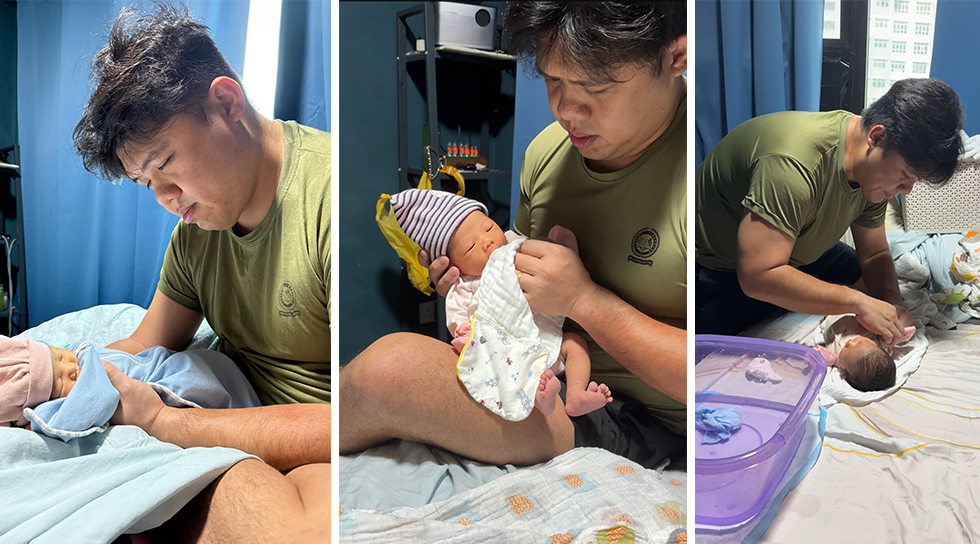
Redefining Fatherhood for Working Dads
There are still many misconceptions surrounding paternity leave. One of the most common concerns Sean hears from other new fathers is the same one he once had: the fear of falling behind at work.
“Some people assume dads take it just to enjoy a ‘holiday’ or to slack off,” Sean said. “But anyone who’s done it knows... it’s far from a break.”
He wanted to ensure that he didn’t contribute to that perception. “Once I knew a baby was coming, I worked closely with my boss to arrange everything properly. These included clearing tasks, setting expectations and making sure the team was covered.”
The key, he believes, is planning. He quotes Benjamin Franklin, “If you fail to plan, you plan to fail.”
That meant starting the conversation early, being responsible, and staying lightly contactable when necessary. “It wasn’t about disappearing. It was about being responsible and present in both roles. You don’t need to choose between being a good dad and a good employee. With proper planning and communication, you can do both!”
And for fathers who are still on the fence about whether it’s worth it?
“You’re not just ‘helping out.’ You’re building the foundation of your relationship with your child and your partner’s recovery. One day, your baby will smile just from hearing your voice. And in that moment, you’ll know exactly why it was all worth it.”
From Burps to Bonds
At just five months old, Aria already turns when she hears Sean’s voice.
“She’s used to my voice, my presence, and the rhythm of how I speak to her. That early connection built a sense of familiarity and trust. Even though she can’t talk yet, I feel like we already have this little bond.”
For Sean, those early weeks of confinement weren’t just about preparing soups or doing household chores. They were basic fatherhood training to him.
“There’s no ceremony, no awards for fatherhood,” he said. “Showing up for the people who matter most to us. That’s all it matters.”
Published in Jun 2025
.tmb-small.png?Culture=en&sfvrsn=bb85edfb_1)
